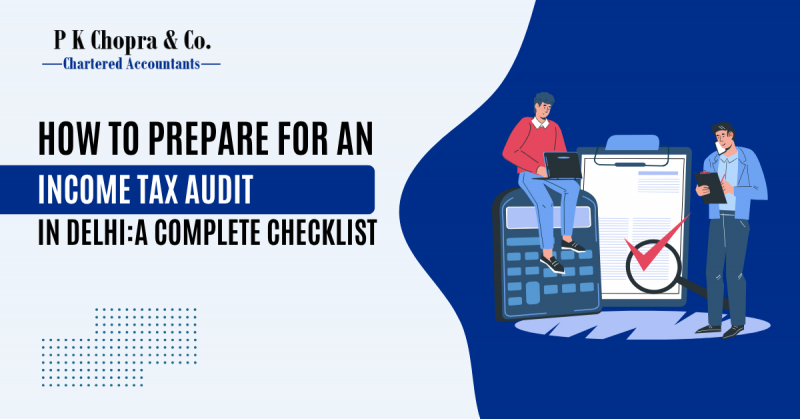How to Prepare for an Income Tax Audit in Delhi: A Complete Checklist
Delhi, the capital city of India, is not only home to countless startups and MNCs, but also a major hotspot for tax scrutiny. If you’re running a business, practicing as a professional, or earning significant income, the Income Tax Department might choose to audit you. But don’t panic—preparation is your best defense.
Let’s walk you through everything you need to know to prepare for an Income Tax Audit in Delhi in 2025.
What is an Income Tax Audit?
An income tax audit is a detailed examination of your financial books, transactions, and compliance with the tax laws under Section 44AB of the Income Tax Act. The goal is to ensure your income is accurately reported, deductions claimed are valid, and tax liabilities have been fulfilled correctly.
Who Needs to Undergo a Tax Audit in India?
You’re required to get your accounts audited if:
- Your business turnover exceeds ₹1 crore (or ₹10 crores if cash receipts & payments are less than 5%)
- Your professional receipts exceed ₹50 lakhs
- You opt for the presumptive taxation scheme but declare lower income than prescribed
If you fall into any of these categories and are based in Delhi, brace yourself for an audit.
Triggers for an Income Tax Audit in Delhi
Here are some red flags that could lead to an audit:
- High-value transactions (luxury purchases, large cash deposits)
- Mismatch between GST returns and ITR
- Reporting large business losses repeatedly
- Inconsistent or vague income declarations
- Not filing ITR on time
Documents Required for Income Tax Audit
Start preparing the following documents:
- Books of accounts (Ledger, journal, cash book, etc.)
- Form 3CD – the tax audit report
- Bank statements
- GST Returns
- TDS Certificates
- Sales & purchase invoices
- Salary and payroll details
- Loan statements
Step-by-Step Checklist to Prepare for a Tax Audit
1. Review Accounting Records
Double-check all ledgers and trial balances. Ensure every transaction is properly recorded.
2. Reconcile Bank Statements
Any mismatch can lead to suspicion. Make sure your books and bank records are in sync.
3. Match GST and ITR Filings
Discrepancies here are a major red flag. Align your GST returns with income tax filings.
4. Verify TDS Deductions
Ensure TDS has been properly deducted and deposited with the government.
5. Classify Expenses Correctly
Capex vs Opex? Make sure they’re properly distinguished to avoid disallowance.
6. Organize Supporting Bills
Keep all purchase orders, vouchers, and payment proofs ready and digitized.
7. Coordinate with Your CA
Always work closely with a qualified Chartered Accountant—like PK Chopra & Co.—who can audit your books efficiently and help avoid errors.
Common Mistakes to Avoid
- Late Filing of Tax Audit Report (Form 3CD)
- Ignoring income tax notices
- Not responding to queries from the AO
- Missing backup documentation
- Incorrect PAN/TAN or GST entries
How PK Chopra & Co. Can Help
With over 60 years of industry experience, we’ve helped hundreds of businesses in Delhi and across India prepare for smooth and hassle-free tax audits.
Why choose us?
- Local presence in Gurugram & Delhi NCR
- In-depth tax knowledge
- Transparent communication and timely compliance
- Strong team of expert Chartered Accountants
Let PK Chopra & Co. be your partner in audit preparedness.
Benefits of Being Audit-Ready
- Avoid interest and penalties
- Build credibility with financial institutions
- Focus on business growth instead of tax worries
- Better long-term compliance record
When is the Tax Audit Report Due?
Generally, the due date for submitting Form 3CD (Tax Audit Report) is September 30 of the assessment year.
Delays can attract penalties under Section 271B.
Use Technology to Stay Ahead
- Use software like Tally, Zoho Books, QuickBooks for easy ledger management
- Integrate GST, TDS, and Income Tax filings
- Utilize e-filing portals for secure submission
What Happens During the Audit?
- The Assessing Officer may call you for an online or in-person audit
- You’ll need to present your books and supporting documents
- The officer might ask specific questions about business transactions, investments, or loans
- You’ll receive feedback and possible demand notices if discrepancies arise
Conclusion: Stay Ready, Not Scared
An income tax audit doesn’t need to be a nightmare. With proper preparation, expert guidance, and accurate books, it can be a smooth process. If you’re in Delhi and feeling unsure, let PK Chopra & Co. take the lead.
We’ve got the team, the tools, and the experience to ensure you sail through your tax audit with confidence.
FAQs
Q1. What is the penalty for not getting a tax audit done?
A penalty of 0.5% of turnover or up to ₹1.5 lakh may be levied under Section 271B.
Q2. Can a salaried employee be audited?
Yes, if they have additional income or discrepancies in reported data.
Q3. Is the audit mandatory every year?
Only if you meet the threshold criteria under Section 44AB.
Q4. How long does a tax audit take?
Depending on complexity, it could take 1–4 weeks.
Q5. Can I get help from a CA firm for the audit?
Absolutely. A firm like PK Chopra & Co. will guide you through every step.

